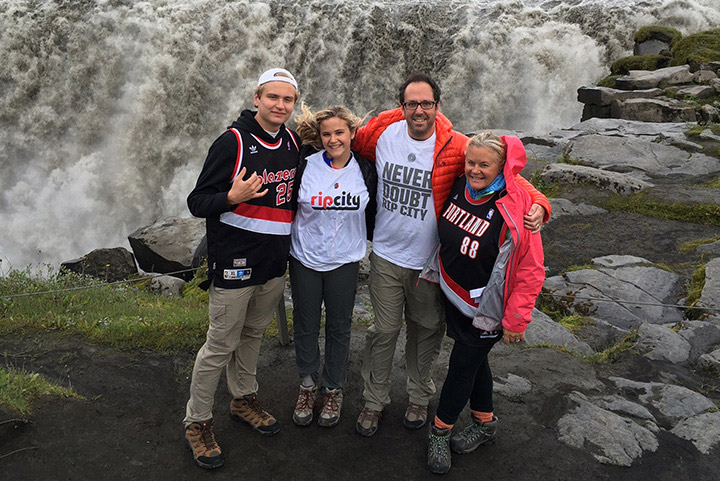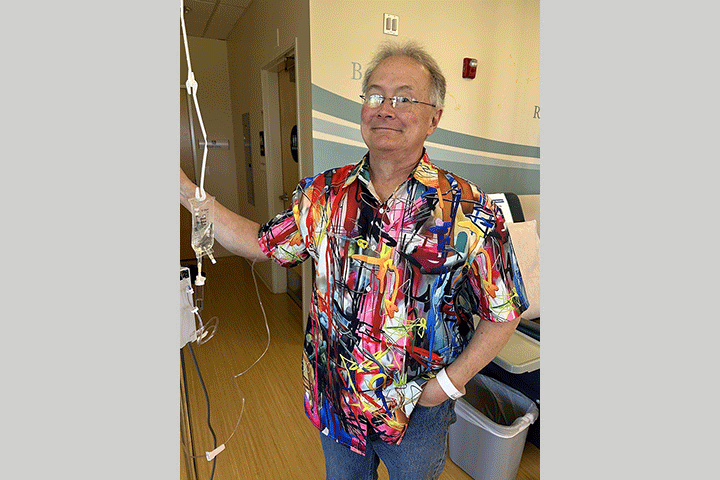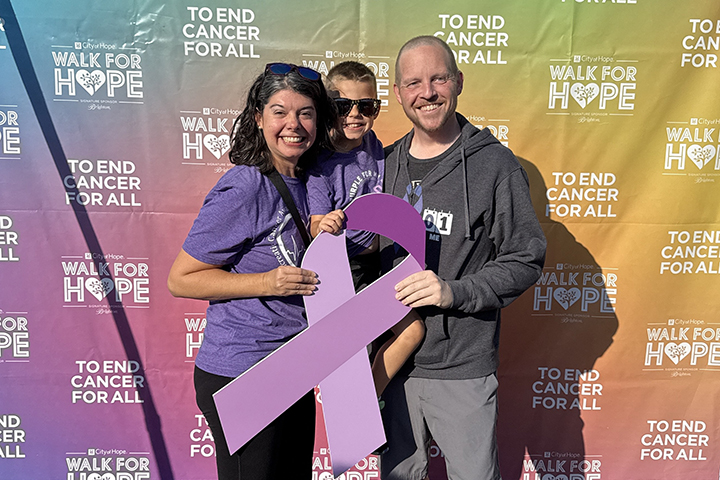Learning All I Can About PNET

- Double diagnosis of pancreatic neuroendocrine tumor and kidney cancer
- Chemotherapy for PNET
- Maintaining my health through integrative techniques
- Educating myself about my disease
You know how in the movies, people are invited by their doctor into a serene, mahogany-paneled office, and the doctor, in a very somber tone, says “I have to give you some bad news, we found cancer”? Well, that’s not how I found out.
Let me digress for a minute before I bring it back to the present day. I currently live in Portland, Oregon, but I am a native New Yorker and have lived in cities across the country. I spent a lot of my life in Connecticut and in the Hamptons (back when it was much more understated than it is now). Unfortunately, I contracted chronic Lyme disease and have been sick for a long time (please check for ticks!).
I had two very stressful jobs in the past four years, and the stress of work, getting laid off, chronic Lyme, ulcers, and other issues led to a big decline in my health from about 2019 on. My GI tract was bad, I had brain fog (a symptom of chronic Lyme) and other issues. Fast forward to June of 2021 when I really started to go downhill and I got laid off. In May of 2022, I was in Boston for a conference and experienced a really scary brain fog episode. I couldn’t text, email, order food, recall people or concepts. My wife told me to get on the next flight home, which I did, and my wife and my naturopath helped me recover. But I relapsed in late June.
What Is Wrong With Me?
My wife finally said, “We can’t do this anymore, we need to get you checked out,” so we went to the emergency room. They found I had a big build-up of ammonia in my brain (hepatic encephalopathy) due to liver malfunction. We then found that I had internal bleeding from an ulcer in my duodenum that had never healed.
Internal bleeding = admittance to the hospital. My brain fog was bad enough at this point that I wasn’t always coherent. The doctors were completely focused on stopping the internal bleeding (which was the right thing to focus on). I was coherent and could hear and understand everything that was going on the day after an upper endoscopy, when I heard the GI doctor whisper to my wife, “He knows he has cancer, right?” That’s how I found out. No mahogany- paneled office for me! I tend to not do things in traditional ways so I guess it made sense. My diagnosis date (at least what I use) is July 9, 2022.
Details About My Tumors
The doctors stopped the bleeding and after two weeks I got out of the hospital. THEN I started to focus on my cancers—yes , I have two of them: PNET, or pancreatic neuroendocrine tumors and renal clear cell carcinoma (ccRCC), kidney cancer for those among us who prefer nonmedical terms, like me!
Definition is important for PNETs and my tumor is non-functioning and a well-defined grade 2 with a Ki-67 of 13 percent. The primary tumor is in my pancreas but has spread to my liver and some lymph nodes and other spots, making it stage IV. I am still learning about my ccRCC, but it hasn’t metastasized (that we know of). I am meeting with a urologic oncologist in January.
Primarily I have had CT scans, but because I have PNET I have had a DOTATATE PET scan, and an MRI for my brain, to rule things out. The MRI was unremarkable (which apparently is good); unremarkable is my favorite new medical term (screw you, my brain is completely remarkable!). I have also had ultrasounds for blood clots, and have a blood draw once a month. I track everything through an online portal called MyChart, but I also have my own dashboard where I follow the trends of my results for key metrics.
My Treatment Protocol
I am being treated at Oregon Health & Science University (OHSU), in Portland. I am currently on the CAPTEM chemotherapy protocol (capecitabine and temozolomide). I will stay on this until it seems to stop working or until my platelets drop below 100 (right now they are at 157). Once that happens, I get to have surgery (which scares me more than the cancer). My surgeon told me they will remove the primary tumor in the tail of my pancreas (distal pancreatectomy), one of the lobes of my liver, my spleen, and my gallbladder. I am hoping they can do the affected part of my kidney (to deal with my ccRCC) as well but I don’t have confirmation yet on the kidney piece of this. My surgeon (Dr. Rodney Pommier—a NETs surgery god) has told me the liver is the thing that will dictate how I survive this so it’s priority #1. Both the surgeon, my medical oncologist Dr. Guillaume Pegna, and the urologist he has consulted with all agree that my PNET is the priority over my ccRCC, especially since it’s metastasized and is in my liver. So, for now, CAPTEM it is.
I consider myself very lucky in that the symptoms of the disease are very light. I have GI issues (with diarrhea, although it’s sporadic), I am fatigued, have some circulation issues in the feet and hands, but most of my other symptoms are pretty low-key.
Educating Myself About PNET
By nature, I am curious and do not like relying only on other people. When I was diagnosed in July, I enrolled myself in my self-taught “Learn everything there is to know about PNET” course. I researched support groups and tried all of them. I watched videos, read articles, talked to other patients (with my cancers and others), asked my oncologist for resources, and basically immersed myself in all of it.
One of the areas that I am most interested in is genomic testing. I have a friend who has stage IV prostate cancer, diagnosed eight and a half years ago. He worked at Intel and pushed the company and his doctors to sequence his genome before it was common. He inspired me. I had my genome sequenced at OHSU, but the tests showed nothing. I don’t have anything like VHL syndrome, which is common for people with my two types of cancer. I was working with PanCAN (a GREAT organization) to have Tempus Labs sequence my tumor’s genome, to possibly find applicable clinical trials or more targeted treatments. However, there was not enough biopsy material for Tempus to use. However, this is an important aspect of treatment for patients.
I am currently not in any clinical trials but am constantly reading about the trials that are out there and discussing them with my oncologist. One of those I am most interested in focuses on histotripsy which cavitates tumors using ultrasound waves and is completely noninvasive (and who doesn’t want that!). I am now an official genomics and PNET nerd and I am proud!
Working on My Health in Other Ways
But wait, that’s not all. I am a HUGE believer in integrative medicine and natural remedies. I feel like my doctors at OHSU are tasked with killing the bad stuff in my body, but my naturopath team, me, my wife, and others are responsible for helping me make sure my body and mind are in good enough shape to deal with the killed stuff and to heal. So I am trying a bunch of things:
- I am doing more yoga (I try to go twice a week) which helps me mentally and helps my body work better. It feels like it opens my body’s pathways so things can flow more easily.
- I am trying to walk as much as I can. Each day I walk usually close to three miles and on some days up to six miles.
- I eat extremely healthfully. Lots of fruits and veggies, a little meat (but just a little). I cheat once in a while because hey, I’m human and need to enjoy stuff too!
- I drink lots of water (never enough though).
- I go to therapy once a week.
- I meditate, stretch, and do other similar activities.
- I take my iron supplements (oh yes, I am anemic too) with orange juice to help with the absorption.
- I have also done special vitamin and supplement treatments.
I am now officially volunteering for SIO (Society for Integrative Oncology) which is all about evidence-based integrative oncology (think acupuncture for pain management) and the Healing NET Foundation which helps connect NET patients to resources that will help them thrive. I am also doing some work for OHSU to help them with patient experience.
My last CT scan showed stabilization or reduction in tumor size. As I said earlier, I have very light symptoms, my brain is fine, and I am using it as much as I can. I do volunteer work and consulting, I network with other people in my profession, I drive and meet people for coffee or meals, I cook, shop, etc. I am basically living a normal life. I am not sure I can tell you exactly which one thing makes the difference, but all of it together is certainly helping. I am not a religious person at all but I am extremely thankful and grateful for how well I am doing.






